Transcendence Review
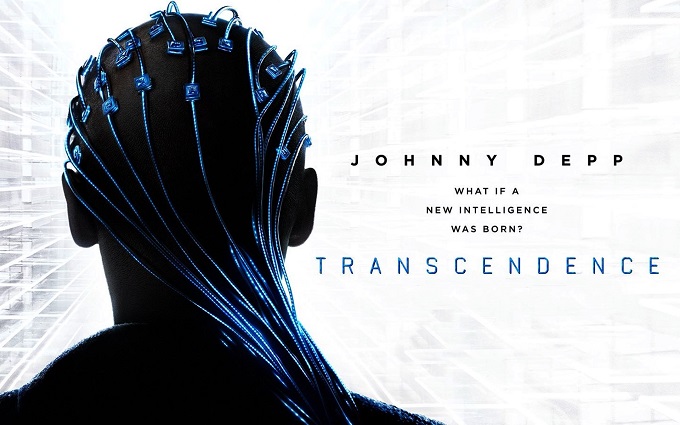
The Plot:
Dr Will Caster, a brilliant scientist on the verge of creating a powerful new artificial intelligence, is fatally injured in an assassination attempt by a violent anti-technology organisation. His desperate wife and best friend help copy his consciousness onto a computer as he slowly dies. But who or what have they really created…?
The Good:
Christopher Nolan’s critically acclaimed cinematographer Wally Pfister makes a solid directing debut, with a movie that actually bears many of Nolan’s hallmarks. Transcendence is an intelligent science fiction film that refreshingly relies more on big ideas than big explosions. It shuns cheap theatrics and superfluous action set pieces in favour of a serious exploration of the growing interface between man and machine.
The film packs artificial intelligence, nano-technology, gene therapies, matter manipulation, hive minds and environmental control into one simple and cohesive narrative. It’s a story that also manages to avoid all the usual genre clichés of secret government organisations or megalomaniac billionaire villains. For science fiction fans it’s likely to be a welcome change from a lazy combination of Transformers and pyrotechnics.
The film is helped along by a genuinely impressive cast which includes Johnny Depp, Rebecca Hall, Morgan Freeman, Cillian Murphy, Kate Mara and Paul Bettany. Rebecca Hall in particular carries much of the film, as her character struggles to reconcile her love for her husband with her growing uncertainty about what ‘he’ is becoming. Johnny Depp and his familiar husky tones also breathe convincing electronic life into the increasingly omniscient and morally ambiguous digital copy of Dr Will Caster.
The Bad:
Although Transcendence touches readily on a whole range of interesting philosophical and technological issues, in truth there’s actually fairly limited discussion surrounding these ideas. Clever concepts provide the film with plot points and a sense of narrative momentum, but never quiet give it the same aura of profound depth that film’s like Inception accomplished with much simpler ideas. Perhaps with Nolan directing and help from a Hans Zimmer soundtrack the film could have attracted enough attention/emotion to have an impact on pop culture and at the box office.
Fans expecting typical blockbuster action may be left disappointed by the films slow burning technological drama. Though it might be welcomed from a low-budget indie effort, it’s not what audiences naturally expect from a heavily marketed Hollywood film with a $100million dollar budget and a truly A-List cast.
Much of the cast have little to do with their considerable talents. Morgan Freeman, Cillian Murphy and Kate Mara could all easily have been replaced by less familiar and gifted performers. Their mere presence lends the film credibility at the cost of heighted audience expectations that are never truly met.
The Ugly Truth:
Transcendence deserves much better than its weak box office opening. It’s actually a thoughtful and well-crafted technological thriller that echoes many classic sci-fi films and explores intriguing possibilities for mankind’s future.
Muppets Most Wanted Review
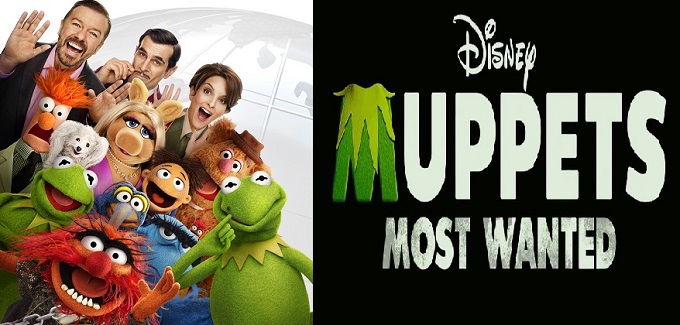
The Plot:
Having reunited and re-established their fame The Muppets are convinced by a smooth talking agent Dominic Badguy to set out on a world tour. But when the world’s most dangerous Frog Constantine breaks out of a Siberian prison the Muppets find themselves caught up in his evil schemes and another elaborate crime caper, pursued by Interpol and the CIA.
The Good:
The Muppets made a long overdue but triumphant return to the big screen in 2011. Director James Bobin and musician Brett McKenzie recaptured much of the magic of the Muppets that had once appeared lost with the untimely passing of Jim Henson. Rescuing the franchise from inferior quality straight to DVD efforts the last film was a heartfelt homage to the original charms of his beloved creations. Muppets Most Wanted happily continues that revitalisation.
Music has always been one of the Muppets most effective tools for demonstrating their unique combination of whimsy and humour. Opening number We’re Doing a Sequel is a catchy encouraging start and the songs that follow are all likely to provoke big smiles. A lavish musical homage to a Siberian prison, cheesy love ballad I’ll Get You What You Want and a final reprise of classic Muppet track Together Again are among the toe tapping highlights.
The Muppets have also always been able to rely on cameos from an array of famous faces. The Muppets are so universally popular that the likes of Lady Gaga, James McAvoy, Tom Hiddleston and Céline Dion will gladly drop everything for just a brief appearance. Armed with their resurgent popularity Muppets Most Wanted is easily the most star packed of all the Muppets adventures.
Ricky Gervais, Ty Burrell and Tina Fey do fine work in more substantial human roles, both clearly relishing every moment they get to play alongside their childhood heroes. Though easily and consistently outshone but their Muppet co-stars they clearly don’t seem to mind.
New villainous Muppet Constantine is also great fun. The evil frog that bears an uncanny resemblance to Kermit is a mischievous delight, complete with a garbled Russian accent and amusing mean steak.
The Bad:
While Flight of the Conchord’s funnyman Brett McKenzie returns to provide an array of entertaining songs for the new sequel in truth they don’t quite match the memorable charms of his Oscar winning efforts in the last film. Although there’s plenty to smile about and a few catchy moments at times it perhaps lacks the heart that made songs like Rainbow Connection and Man or Muppet so effective.
Overall that is perhaps the only criticism to be made of Muppets Most Wanted; it’s slightly lacking the cohesive emotional narrative of the Muppets 2011 return. Unlike its nostalgia infused predecessor Muppets Most Wanted is a throwback to the straightforward silliness of the usual Muppet adventures, its charming fun but without quiet as much emotional subtext and sentimental impact.
Devoted Muppet fans may perhaps also be a little disappointed to see popular characters like Gonzo, Rizzo the Rat and Pepe the King Prawn once again given minimal screen time. As the latest film continues the trend of giving prominence to key figures like Kermit, Fozzie and Miss Piggy.
The Ugly Truth:
In a world of cynicism and overblown CGI it’s a heart-warming delight to have the tangible whimsy of the Muppets back on the big screen. Lifelong fans and the newest generation of captivated kids will welcome the latest dose of well-polished Muppet musical madness.
Svengali Review
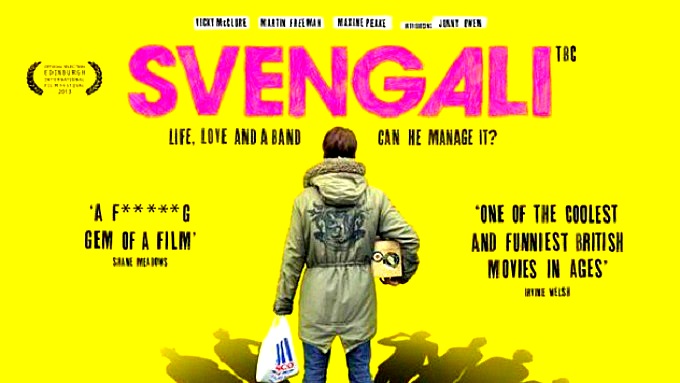
The Plot:
Welsh dreamer Dixie moves to London with his loving girlfriend Shell to become the manager for a little known rock band The Premature Congratulations. Determined to turns them into the biggest thing since The Beatles Dixie faces all sorts of obstacles I his quest to become a great musical Svengali. Along the way he experiences the highs and lows of the music industry while being guided by real life Creation Records Guru Alan McGee and with an old school friend deliberately trying to stand in his way.
The Good:
Svengali is a film about the music industry so a great soundtrack was always utterly essential. While the audience never quite gets to hear mythical band The Prems ever actually play a proper song, we do hear a well assembled collection of songs from classic artists and fresh talents alike. The Stone Roses, Jake Bug, The Small aces and Mott The Hoople are just some of the musical magic the film offers. The superb quality of the soundtrack caries the film throughout and particularly keeps things watchable during any slower moments.
Writer and leading man Jonny Owen is so earnestly likeable that it’s impossible not to want his naïve hero Dixie to succeed in the face of a seemingly never ending string of disaster and financial woes. This Is England star Vicky McClure is an equally endearing and accomplished acting talent. The central relationship between Dixie and devoted girlfriend Shell provides a convincingly mundane and affectionate counterpoint to the harsh realities of the greedy underbelly of the music industry.
Svengali features a lot of familiar and very welcome faces. Sherlock star Martin Freeman clearly enjoys a comedy turn as a grumpy record shop owner with a nagging wife and eccentric Mod wardrobe. IT Crowd star Matt Berry and Morwenna Banks also both steal scenes as variously accented but equally hilarious caricatures of record label executives. Watching Berry’s implausibly dressed studio boss berate his grovelling flunkies with spectacularly apathetic disdain is a particular pleasure.
The presence of real life musical figures like Alan McGee and Carl Barat lends the film some deserved musical credibility, further supporting the accuracy of its amusing tale of explosive overnight indie band success.
The Bad:
It feels cruel to criticize Svengali as it does accomplish so much with such little budget and is evidently made with precisely the kind of unashamed enthusiasm that makes Dixie a likeable dreamer. Though the film does occasionally lag in pace, take predictable turns or fail to quite land laughs as big as it aspires to a note perfect soundtrack almost always rescues the situation.
Perhaps the only real problem the film faces is that the greedy cut throat side of the music industry is so well known that it makes the film’s seemingly accurate depiction feel unoriginal. In-fighting arrogant bands, vile A&R men and backstabbing betrayal are such a common feature of rock and roll films that it feels almost overly familiar.
It’s also fair to say that with the exception of Dixie many of the people he meets along his quest, including his own supposedly ‘amazing’ band, are unlikeable character with an assortment of loathsome selfish character traits. But then perhaps that’s the entire point of the film.
The Ugly Truth:
Svengali is a low budget indie comedy that boasts a surprising amount of familiar face and the best soundtracks it could possibly have assembled. After a slow heart it delivers enough heart and humour to carry itself to a satisfying if somewhat surprising conclusion.
Check out red carpet interviews with the cast and celeb guests from the Svengali London Premiere below:
300: Rise of an Empire Review
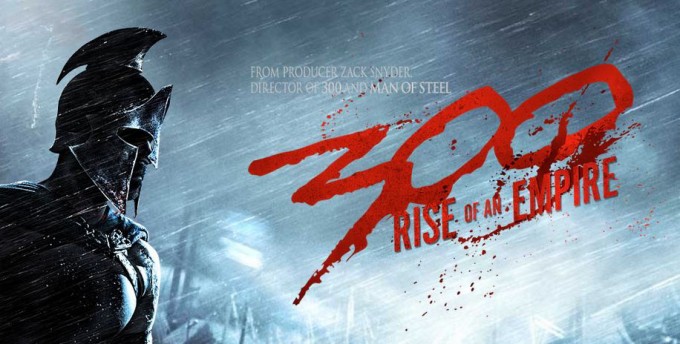
The Plot:
A brave general Themistokles leads a band of inexperienced Greek warriors against the vast armies of the invading Persian Empire led by the depraved god-king Xerxes and Artemisia, the vengeful female commander of the feared Persian navy. Once again the defendant stand of a small band of warriors helps inspire the emerging Greek nation to stand up against a daunting tide of evil.
The Good:
Those who perhaps found the original 2006 film 300 too horrifically violent may find the sequel’s commercially motivated move towards more teen friendly cartoonish action a welcome shift. Despite the near constant tide of death and graphic dismemberment, the film shouldn’t bother even squeamish audiences too much. The gushing spurts of CGI blood are so big and obviously fake that they ironically serve to conceal anything genuinely gory or unpleasant. The violence looks and feels more like a video game than the real horrors of ancient war. The film is too preoccupied with looking stylish to ever be genuinely terrifying or emotionally tense.
Eva Green is a captivating redeeming feature; almost single handily keeping this film watchable, despite some of its more obvious failings. Armed with a naturally piercing gaze and a dangerously sly smirk she is a seductively menacing presence. It’s rare and almost unique to find a villainess so genuinely ruthless and imposing on screen. The film even does her character the justice of giving her a credible backstory. In truth the film would almost have been better off focusing exclusively on her character’s story in its own right.
Such is the strength of Eva Green’s screen presence that not even gratuitous nudity or outlandish CGI blood splatters can obscure the quality of her performance. Of course a teenage target audience will almost certainly welcome Eva Green nudity even more than the endless slow motion fight sequences.
The Bad:
Leading man Sullivan Stapleton lacks the brutal macho charisma of Gerard Butler’s iconic portrayal of brave but doomed Sparta King Leonidas. Likewise the film’s supporting cast of Greek warriors feel at times like the poor muscle deprived cousins of the original film’s Spartan heroes. The 2006 original boasted a convincingly rugged cast that included Dominic West and Michael Fassbender. Skins star Jack O’Connell for example is a far less convincing shirtless soldier and sadly feels like a poor man’s substitute for more familiar faces.
The main problem for 300 Rise of an Empire is that it confusingly positions itself as a companion piece to the 2006 film, rather than just a straightforward sequel. The muddled timeline sees the story mostly unfold alongside the plot of the original film and frequently jump to older events to explain its elaborate backstory.
300 was a box office phenomenon which understandably left the studio and perhaps fans eager for more. But as a story it couldn’t have been more self-contained. Few endings are ever more definitive than everyone dying. Rise of an Empire struggles to reimagine the original plot and heavy handily add new characters with fresh excuses for slow motion fighting. Anyone unfamiliar with the first film will be a little bemused by the constant contrived references to what the never seen Leonidas and his 300 men are actually up to. Even the characters that do return, like Lena Headey’s Spartan Queen Gorgo and evil Persian warlord Xerxes, have little screen time or impact.
The Ugly Truth:
300: Rise of An Empire recreates the stylized look of Zack Snyder’s 2006 effort but fails to quite capture its angry macho magic. A superb villainous display from Eva Green rescues the film from being lost at sea. As a sequel the film essentially repeats the successful formula and plot of the original whilst making little changes beyond moving the action sequences onto the sea for a series of similar navel battles.
Overall devoted fans of the original will be pleased to see an unlikely sequel finally come to life, but it won’t win over those who don’t appreciate Zack Snyder’s trademark comicbook visuals.
Official Trailer below:
Non-Stop Review
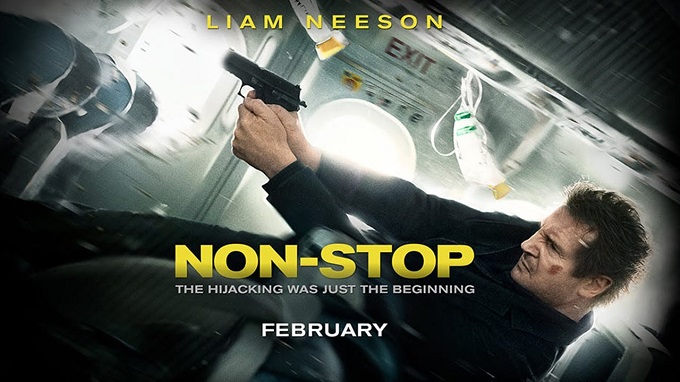
The Plot
A world weary US Air Marshal has his transatlantic flight interrupted by a text message from an anonymous source threatening to kill a fellow passenger every 20 minutes unless $150 million is paid into a designated account.
The Good
Transformed by the astonishing box office success of Taken, Liam Neeson has been enjoying a spectacular career reinvention as an action superstar. Armed with a towering 6’4” physical presence, gruff no-nonsense voice and blistering fists of fury the 61 year old Oscar winner has rapidly redefined himself. With Unknown, The Grey and the inevitable Taken sequels Neeson has emerged as one of the most bankable bad guy beating action heroes. Non-Stop continues to exploit that winning formula in a predictable but mostly satisfying fashion.
Neeson’s Non-Stop character makes sure to incorporate all the typical elements of his successful action roles. As usual he’s a troubled father using ruthless skills and uncompromising determination to single handily overcome massive odds to rescue the imperilled. As expected, he’s also routinely betrayed by those around him whilst battling inner demons and faceless adversaries. It may be familiar, but it’s also an entertaining guilty pleasure.
Liam Neeson has a rare gift for delivering dialogue with a combination of unashamed intensity and self-aware irony. As an Oscar winning dramatic actor ‘slumming it’ in genre clichés he takes full advantage of understated comedic tones, following occasionally clunky dialogue with a deadpan stare or a knowing smirk. Regularly punctuating any dangerously quiet moments of audience reflection with a ruthless piece of action also serves him well. They’re well-timed punches to bad guys and boredom.
The Bad
Non-Stop sets up an interesting premise with its claustrophobic mid-air setting but soon faces a difficult task in maintaining that simmering paranoid tension at boiling point for a feature length story. Inevitably the film quickly finds itself required to resort to increasingly unlikely plot devices to perpetuate the action. It’s ultimately impossible for the film to deliver a resolution which is inventive and original enough to be entirely satisfactory.
Julianne Moore plays ‘female lead’ alongside Neeson, but it’s a purely functional role that fails to inject any convincing emotion or drama. The character feels like a massively missed opportunity, particularly during the film’s lengthy hunt for the criminal mastermind hiding in plain sight amongst the 150 passengers.
Beyond Neeson and Moore the film does also feature a few familiar from the cast of Downton Abbey and House of Cards, but sadly they serve as little more than set dressing. Given two dimensional roles with only minimal unsatisfactory dialogue they do little more than populate the plane. It might be a crowded flight but it’s a crowd lacking in depth, drama or personality.
Ultimately the film could have easily injected more paranoid doubt into audiences’ minds, without being solely reliant on Neeson’s frantic response to anonymous threats and a few lazy plot twists.
The Ugly Truth
Without Liam Neeson Non-Stop would certainly have crashed shortly after take-off, but thanks to his innate charisma and weary workmanship it remains a watchable addition to his growing catalogue of guilty action genre pleasures. A welcome distraction in particular for any fans eagerly waiting for Taken 3.